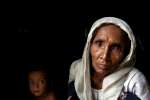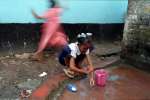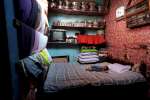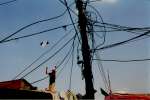Home > About Us > The High Commissioner > High Commissioner's Dialogue > High Commissioner's Dialogue on Protection Challenges, 2008
High Commissioner's Dialogue on Protection Challenges, 2008

Protracted Refugee Situations
In 2007, UN High Commissioner for Refugees António Guterres established a process to facilitate informal consideration of global protection issues by UNHCR, states and other stakeholders. The first meeting of the High Commissioner's Dialogue on Protection Challenges took place in December 2007 in Geneva and discussed the connection between asylum and refugee protection and international migration. The second meeting of the Dialogue took place on 10-11 December 2008 at the Palais des Nations in Geneva.
The 2008 meeting focused on protracted refugee situations and examined the challenges and opportunities for refugees and other stakeholders in camps, rural and urban contexts. The Dialogue moved forward discussions on the work that the UN refugee agency is pursuing in targeted protracted refugee situations under the auspices of a "Special Initiative on Protracted Situations." In particular, the Dialogue examined instruments that could critically affect and unlock protracted refugee situations. A concept paper outlining the key discussion points is available.
Two side events were organized. In one, an update was provided on UNHCR's follow-up of the results of the first Dialogue meeting last December. The second event provided the opportunity for a preliminary discussion on the challenges relating to refugees and asylum seekers in urban settings, an issue that will be the subject of further consideration in 2009.
See also the High Commissioner's Dialogue pages on UNHCR's French and Spanish language websites:
Deuxième réunion du Dialogue du Haut Commissaire sur les défis de protection, 2008
Diálogo del Alto Comisionado sobre los Retos de la Protección 2008
From the Archives: Protracted Refugee Situations
A wide-ranging collection of UNHCR documents on the issue published since 1999.
 High Commissioner's Dialogue 2008 Documents
High Commissioner's Dialogue 2008 Documents
- List of participants, High Commissioner's Dialogue on Protection Challenges, Geneva, 10-11 December 2008
- High Commissioner's Dialogue on Protection Challenges. Theme: Protracted Refugee Situations: Chairman's Summary (11 December 2008)
- Agenda, High Commissioner's Dialogue on Protection Challenges, Second Meeting, Geneva, 10-11 December 2008
- Keynote address by the Honourable Mizengo Peter Pinda (MP), Prime Minister of the United Republic of Tanzania at the Second United Nations High Commissioner for Refugees' Dialogue on Protection Challenges on the Theme of Protracted Refugee Situations, Geneva, 10 December 2008
- Protracted Refugee Situations: High Commissioner's Initiative























